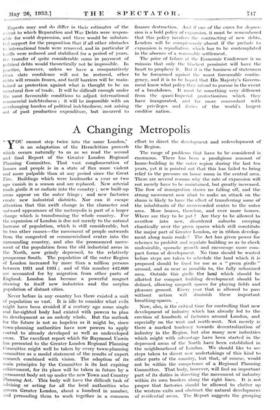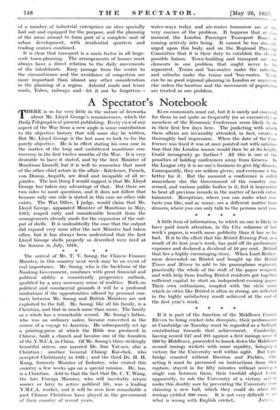A Changing Metropolis “y 011 cannot step twice into the same
London,' is an adaptation of the Heracleitian proverb which occurs naturally to us as we read the second and final Report of the Greater London Regional Planning Committee. That vast conglomeration of houses and people is in a state of flux more violent and more palpable than at any period since •the Great Fire. Buildings which were landmarks a year or two ago vanish in a season and are replaced. New arterial roads girdle it or radiate into the country ; new built-up areas appear on the outer fringe ; and new factories create new industrial districts. Nor can it escape attention that this swift change in the character and outward appearance of the metropolis is part of a larger change which is transforming the whole country. For the expansion of London is due not merely to the natural increase of population, which is still considerable, but to two other causes—the movement of people outwards from the congested or commercialized centre into the surrounding country, and also the pronounced move- ment of the population from the old industrial areas in the North, now grimly depressed, to the relatively prosperous South. The population of the outer Region of London increased by more than a million persons between 1921 and 1931 ; and of this number 442,000 are accounted for by migration from other parts of England. London has become a powerful magnet drawing to itself new industries and the surplus population of distant cities.
Never before in any country has there existed a unit of population so vast. It is idle to consider what evils might have been avoided if a: century ago some single and far-sighted body had existed with powers to plan its development as an orderly whole. But the outlook for the future is not so hopeless as it might be, since town-planning authorities have now powers to apply control to 'already developed as well as undeveloped areas. The excellent report which Sir Raymond Unwin has presented to the Greater London Regional Planning Committee might well be taken by every town-planning committee as a model statement of the results of expert research combined with vision. The adoption of its main principles by the Committee is its last expiring achievement, for its place will be taken in future by a permanent body set up under the new Town and Country Planning Act. This body will have the difficult task of advising or acting for all the local authorities who govern Greater London, about a hundred in number, and persuading them =to work together in a common effort to direct the development and redevelopment of the Region.
The range of problems that have to be considered is 'enormous. There has been a prodigious amount of house-building in the outer region during the last ten years, yet it is pointed out that this has failed to bring relief to the pressure on house room in the central area. There are several reasons why the rate of expansion will not merely have to be maintained, but greatly increased. The flow of immigration shows no falling off, and the strong movement now afoot to make an attack on the slums is likely to have the effect of transferring some of the inhabitants of the overcrowded centre to the outer area. More houses, therefore, and ever more houses. Where are they to be put ? Are they to be allowed to overflow into new, disordered suburbs creeping chaotically over the green spaces which still constitute the major part of Greater London, or in ribbon develop- ment along main roads ? The Act has given power for schemes to prohibit and regulate building so as to check undesirable, sporadic growth and encourage more com- pact forms of development. No time should be wasted before steps are taken to schedule the land which it is proposed should be fixed for use as a " green girdle " around, and as near as possible to, the fully urbanized area. Outside this girdle the land which should be allotted for compact building development should be defined, allowing unspoilt spaces for playing fields and -pleasure ground. Every year that is allowed to pass without action will diminish these important breathing-spaces. _ Now, also, is the critical time for controlling that new development of industry which has already led to the erection of hundreds of factories around London, and 'especially 'on the west and north-west. Not merely is there a marked tendency towards decentralization of industry in the' Region, but also many new industries which might with advantage have been started in the depressed areas of the North have been established in the neighbourhood of London. We should like to sec steps taken to divert new undertakings of this kind to other parts of the country, but that, of course, would not be within the competence of a Regional Planning Committee. That body, however, will find an important part of its duties in directing the movement of industry within its own borders along the right lines. It is not proper that factories should be allowed to clutter up the western exits and obstruct the natural development of residential areas. The Report suggests the grouping of a number of industrial enterprises on sites specially laid out and equipped for the purpose, and the planning of the areas around to form part of a complete unit of urban development, with residential quarters and trading centres combined.
It is clear that transport is a main factor in all large- scale town-planning. The arrangements of houses must always have a direct relation to the daily movements of the inhabitants. Easy passage from the centre to the circumference and the avoidance of congestion are more important than almost any. other consideration in the planning of a region. Arterial roads and lesser roads, Tubes, railways and—let it not be forgotten— water-ways today and air-routes tomorrow are of the very essence of the problem. It happens that at this moment the London Passenger Transport Board is coming actively into being. It cannot be too strongly urged upon this body and on the Regional Planning Committee that it is their duty to establish the closest possible liaison. Town-building and transport are two elements in one problem that ought never to be separated. Trains and 'bus-routes make the suburbs, and suburbs make the trains and 'bus-routes. There can be no good regional planning in London or anywhere else unless the location and the movement of population are treated as one problem.

















































 Previous page
Previous page